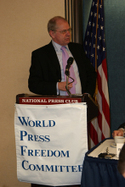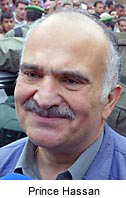by Natasha Tynes | May 9, 2007 | Media watch, Metro Daze
 I’m really excited about the opening of the new news museum dubbed the "Newseum" in Washington, DC in October of this year. It looks to be a top-notch museum and will focus on issues in news-making, which happens to be both my passion and my career.
I’m really excited about the opening of the new news museum dubbed the "Newseum" in Washington, DC in October of this year. It looks to be a top-notch museum and will focus on issues in news-making, which happens to be both my passion and my career.
Here is a brief description:
The Newseum is located at the intersection of Pennsylvania Avenue and Sixth Street, N.W., Washington, D.C., between the White House and the U.S. Capitol and adjacent to the Smithsonian museums on the National Mall. The 250,000squarefoot Newseum will feature seven levels of galleries and theaters that will take museum-goers behind the scenes to experience how and why news is made, and will offer them an experience that blends five centuries of news history with uptothesecond technology and handson exhibits.
Source: [Newseum website]
Among the exhibits featured in the museum will be an interactive newsroom, a great hall of news, "Today’s front pages," and a journalists’ memorial. How cool is that? I’m literally counting the days until it opens. This city gets more and more exciting by the day. I really can’t wait for this phenomenal museum to open its doors to all the news junkies out there.
by Natasha Tynes | May 2, 2007 | Jordan, my nation, Media watch
The nature of my current job requires me to keep a close eye on press freedom violations across the world. I was surprised to see Jordan’s name pop up twice over the last ten days or so as a violator. The first violation involved the confiscation of an Alajzeera interview tape. The second involved the banning of Almajed newspaper because the Jordanian government alleged its front page article "harmed relations with the Palestinian government". Here is an excerpt [full article here] from the Committee to Protect Journalists’ report:
Jordanian authorities should lift their ban on today’s edition of an independent paper, the Committee to Protect Journalists said. Fahd al-Rimawi, editor of the weekly Al-Majd, told CPJ that security agents moved Sunday to prevent printing of the edition because of a front-page story about a "secret plan" to oust the Hamas-led Palestinian government. Al-Rimawi said security officials told him they would ban the April 30 edition if he did not remove the article, the Associated Press reported. In an interview with CPJ, al-Rimawi said the issue had already been sent out for printing. Like many small tabloids in Jordan, Al-Majd is printed by larger publications that own printing presses. In this case, the leading pro-government daily Al-Rai handles Al-Majd’s printing.
Are we witnessing a press freedom backslide in Jordan? For the past several years or so Jordan has been making baby steps towards safeguarding the freedom of the press. One step was the recent scrapping of an article that allowed for the imprisonment of journalists. However, from what I read this week, things are not looking good. It seems the kingdom is regressing to previous years where stifling press freedoms was the norm. I don’t want to jump to conclusions quickly here so I must point out that the Jordanian government has denied banning the newspaper.
Government Spokesperson Nasser Judeh told journalists Tuesday that the government had nothing to do with the issue of printing or banning the fortnightly. Meanwhile, the commercial printing press of the Jordan Press Foundation said it did not print Al Majd because it carried items "violating Article 26 of the Press and Publications Law," which prohibits publishing any material that might threaten national security.
Source: [The Jordan Times]
by Natasha Tynes | Apr 27, 2007 | Media watch
I attended a discussion two weeks ago given by the publisher of the
Danish daily that published the controversial cartoons of the Prophet Muhammad that unleashed a major row last year. During the lecture, given at the National Press Club here in DC, the publisher stood by his paper’s
decision to publish the cartoons. Here is a link to the full article I wrote about the event with an outtake below.

Launching his speech by displaying the controversial
cartoons of the prophet Muhammad, the Chairman of JP-Politikens Hus, a Danish
media conglomerate, defended his paper’s decision to publish the caricatures, while
criticizing U.S.papers for failing to republish them.
Joergen Ejboel, speaking at the National
Press Club in Washington, DC, on April 11, insisted on his
publication’s right to free speech in regard to the cartoons that sparked a
wave of demonstrations and riots throughout the world last year resulting in more
than 100 deaths. Ejboel dubbed the unrestricted freedom of speech as a
"truth" that should not be compromised. "A lot of people were offended by the truth," said Ejboel, referring to a recent court decision of a libel suit filed by French Muslim organizations
against the French newspaper Charlie Hebdo for republishing the cartoons.
"The truth can never be characterized as defamation," he
said, expressing discontent at the French judge’s usage of the word "offensive"
when referring to the cartoons. "If a cartoon can be legal in one context and a crime in
another, then this will leave the door wide open to any group that can come
forward and insist that any cartoon of their leader or hero amounts to
defamation," he told the audience at a lecture organized by the World Press
Freedom Committe. Source: [IJNet]
by Natasha Tynes | Apr 24, 2007 | Jordan, my nation, Media watch
It seems Aljazeera has upset the Hashemite Kingdom of Jordan yet again, though this time the event involves HRH Prince Hassan. The Committee to Protect Journalists reported the following yesterday:
 The Committee to Protect Journalists protests the Jordanian government’s seizure of a taped Al-Jazeera interview with former crown prince Hassan bin Talal last week. Ghassan Benjeddou, Al-Jazeera’s bureau chief in Beirut, told CPJ that Jordanian intelligence officers stopped his producer at Amman’s Queen Alia Airport on Wednesday, shortly after the interview. They proceeded to confiscate the videotape of the interview, as well as several photographs taken of Prince Hassan during the interview.
The Committee to Protect Journalists protests the Jordanian government’s seizure of a taped Al-Jazeera interview with former crown prince Hassan bin Talal last week. Ghassan Benjeddou, Al-Jazeera’s bureau chief in Beirut, told CPJ that Jordanian intelligence officers stopped his producer at Amman’s Queen Alia Airport on Wednesday, shortly after the interview. They proceeded to confiscate the videotape of the interview, as well as several photographs taken of Prince Hassan during the interview.
In the interview conducted by Benjeddou, Hassan spoke critically of Saudi Arabia and U.S. policies in the Middle East, the journalist told CPJ. Citing a U.S. report, the prince said a Saudi official was financing Sunni militants to confront the Iran-backed Lebanese Shiite group Hezbollah. Al-Jazeera identified the official as Prince Bandar bin Sultan, secretary-general of Saudi Arabia’s National Security Council, The Associated Press reported. Hassan also criticized Saudi Arabia for holding political negotiations in the holy city of Mecca, home to Islam’s holiest site, Masjid al-Haram.
And the Jordanian response:
On Saturday, Benjeddou used his program to discuss press freedom in the Arab world and discuss what happened to him. He invited Nasser Judeh, the chief Jordanian government spokesman, to comment. The Jordan Times reported that Judeh told Al-Jazeera that Prince Hassan is "an intellectual whose views are respected the world over," but "there are national interests that should be protected."
The Jordan Times quoted Judeh saying "we cannot afford to have any misinterpretation of Jordan’s stand at this delicate stage," adding, "after all, remember that we live in the Middle East where media outlets are sometimes employed to serve political purposes."
I can see how HRH Prince Hassan’s comments could be controversial but at the same time I’m someone who believes in the total freedom of the press. In my humble opinion, I believe harassing journalists in this fashion and confiscating their work should not occur in a country that strives to be "democratic ." But then again, many would argue that things are not so black and white in the Middle East, and that sometimes there are exceptions. Ah well, I will agree to disagree!
by Natasha Tynes | Apr 4, 2007 | Media watch, The Mideast
Last week, I got the chance to attend a lecture in Washington, DC delivered by Alghad newspaper CEO Mohammad Alayyan on "Developing Media as a Business Model in Jordan." Alayyan raised some very intriguing points while focusing on what he called the "invisible money" hindering the development of independent media. Here is an excerpt from an article I wrote on the lecture:
 Publisher and CEO of the Jordanian independent daily Alghad, Mohammad Alayyan, cited what he referred to as "invisible money" as one of the major obstacles hindering the progress of independent media outlets in the Arab World. Alayyan who is planning to launch Jordan’s first independent terrestrial and satellite TV station, Al Ghad TV, on June 1 made his remarks during a lecture entitled "Developing Media as a Business Model in Jordan" in Washington, D.C., United States, on March 28.
Publisher and CEO of the Jordanian independent daily Alghad, Mohammad Alayyan, cited what he referred to as "invisible money" as one of the major obstacles hindering the progress of independent media outlets in the Arab World. Alayyan who is planning to launch Jordan’s first independent terrestrial and satellite TV station, Al Ghad TV, on June 1 made his remarks during a lecture entitled "Developing Media as a Business Model in Jordan" in Washington, D.C., United States, on March 28.
"Historically, investment in media has not been that great because governments have always invested in the media. People were afraid of opening up media [outlets], so basically it created insufficient funds [for] the development of independent media," Alayyan told the audience at a talk at the Human Rights Campaign building. But this has changed since 2001, according to Alayyan, as investments in the media have dramatically increased in the past few years.
However, Alayyan argues that investments are not made in a transparent way. "A lot of invisible money is going into the media and I think this is one of the major obstacles facing independent media in the Arab World," he said.
Source: [International Journalists’ Network]
You can read the full article here.
by Natasha Tynes | Mar 7, 2007 | Jordan, my nation, Media watch
Jordan’s Press Association (JPA) slammed parliament Thursday for approving a clause in a draft law that allows the imprisonment of journalists. "We reject this decision. We are opposed to the imprisonment of journalists for expressing their opinions by writing, verbally, or by any other means, and linking this to four taboos," JPA president Tarek Momani said. "At the same time we welcome parliament’s decision to scrap a clause calling for the arrest of journalists over publication matters," he added. During its deliberations of a controversial press and publication draft law, the 110-seat lower house approved Wednesday a clause to imprison journalists over four violations outlined in Article 26.
Source: [Middle East Times]
Yes, I’m disturbed by the news but not surprised. The sad reality is that such a step was somehow expected from the current parliament — whose performance thus far has been extremely disappointing. The Jordanian blogosphere wa quick to react to this new development. Khalaf has a nice wrap up of Jordanian columnists’ reaction to this new draft law. Also the UN news agency, IRIN, ran a feature last week detailing the depressing situation facing Jordanian journalists. Here is an excerpt:
Several incidents of attacks and harassment against journalists in Jordan have been reported since the beginning of this year. The latest involved a reporter from al-Rai newspaper, the most widely circulated Arabic daily, who was beaten up by a group of policemen last month in Amman. The journalist, Khalid Khawaja, was admitted to hospital because of wounds sustained in the attack. The police denied wrongdoing and shifted the blame on Khawaja for allegedly "beating and insulting a policeman on duty."
A few weeks earlier, three journalists from al-Ghad, al-Arab al-Yawm and al-Doustour dailies were arrested when they tried to cover a story in the northern city of Irbid and were reportedly threatened by the military governor to leave the area. Also, the editor al-Mehwar weekly tabloid, Hisham Khalidi, was fined US $15,000 on 9 February for publishing controversial material about a public institution. These events have provoked angry reactions from the media community, including the Jordan Press Association (JPA) and rights groups, who said such measures represent a flagrant infringement of basic human rights and curtail media freedoms.
You can read the full IRIN article here.
 I’m really excited about the opening of the new news museum dubbed the "Newseum" in Washington, DC in October of this year. It looks to be a top-notch museum and will focus on issues in news-making, which happens to be both my passion and my career.
I’m really excited about the opening of the new news museum dubbed the "Newseum" in Washington, DC in October of this year. It looks to be a top-notch museum and will focus on issues in news-making, which happens to be both my passion and my career.

 The Committee to Protect Journalists protests the Jordanian government’s seizure of a taped Al-Jazeera interview with former crown prince Hassan bin Talal last week. Ghassan Benjeddou, Al-Jazeera’s bureau chief in Beirut, told CPJ that Jordanian intelligence officers stopped his producer at Amman’s Queen Alia Airport on Wednesday, shortly after the interview. They proceeded to confiscate the videotape of the interview, as well as several photographs taken of Prince Hassan during the interview.
The Committee to Protect Journalists protests the Jordanian government’s seizure of a taped Al-Jazeera interview with former crown prince Hassan bin Talal last week. Ghassan Benjeddou, Al-Jazeera’s bureau chief in Beirut, told CPJ that Jordanian intelligence officers stopped his producer at Amman’s Queen Alia Airport on Wednesday, shortly after the interview. They proceeded to confiscate the videotape of the interview, as well as several photographs taken of Prince Hassan during the interview. 